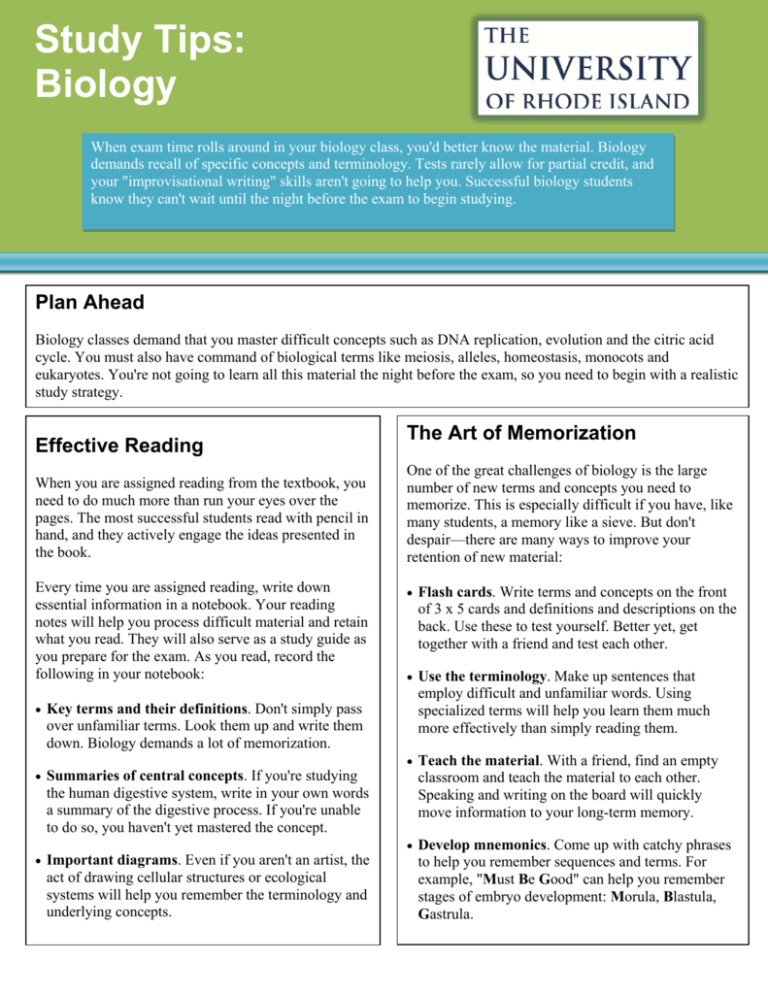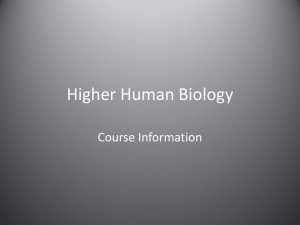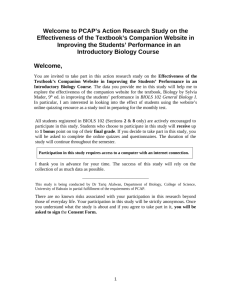Study Tips: Biology
advertisement

Study Tips: Biology When exam time rolls around in your biology class, you'd better know the material. Biology demands recall of specific concepts and terminology. Tests rarely allow for partial credit, and your "improvisational writing" skills aren't going to help you. Successful biology students know they can't wait until the night before the exam to begin studying. Plan Ahead Biology classes demand that you master difficult concepts such as DNA replication, evolution and the citric acid cycle. You must also have command of biological terms like meiosis, alleles, homeostasis, monocots and eukaryotes. You're not going to learn all this material the night before the exam, so you need to begin with a realistic study strategy. Effective Reading When you are assigned reading from the textbook, you need to do much more than run your eyes over the pages. The most successful students read with pencil in hand, and they actively engage the ideas presented in the book. Every time you are assigned reading, write down essential information in a notebook. Your reading notes will help you process difficult material and retain what you read. They will also serve as a study guide as you prepare for the exam. As you read, record the following in your notebook: Key terms and their definitions. Don't simply pass over unfamiliar terms. Look them up and write them down. Biology demands a lot of memorization. Summaries of central concepts. If you're studying the human digestive system, write in your own words a summary of the digestive process. If you're unable to do so, you haven't yet mastered the concept. Important diagrams. Even if you aren't an artist, the act of drawing cellular structures or ecological systems will help you remember the terminology and underlying concepts. The Art of Memorization One of the great challenges of biology is the large number of new terms and concepts you need to memorize. This is especially difficult if you have, like many students, a memory like a sieve. But don't despair—there are many ways to improve your retention of new material: Flash cards. Write terms and concepts on the front of 3 x 5 cards and definitions and descriptions on the back. Use these to test yourself. Better yet, get together with a friend and test each other. Use the terminology. Make up sentences that employ difficult and unfamiliar words. Using specialized terms will help you learn them much more effectively than simply reading them. Teach the material. With a friend, find an empty classroom and teach the material to each other. Speaking and writing on the board will quickly move information to your long-term memory. Develop mnemonics. Come up with catchy phrases to help you remember sequences and terms. For example, "Must Be Good" can help you remember stages of embryo development: Morula, Blastula, Gastrula. Study Tips: Biology Practice, Practice, Practice Throughout the semester, keep asking and answering questions related to what you are learning. Memorization is only part of the equation. You need to understand what you study. Test yourself with the textbook. Chances are each chapter in your textbook concludes with practice questions. Use these to test your understanding of the material. Turn your notes into questions. For each lecture and reading assignment, figure out what the key concepts are and turn them into potential exam questions. Practice writing answers to the questions. Talk Biology with classmates. You'll master biology quickly if you become conversant in the concepts and terminology. Try getting together with classmates on a regular basis to discuss course content. Make it real. Since biology is the study of the living world around you, don't limit your study to a dead textbook. Get out on campus and apply your knowledge to the flora and fauna you encounter. Practice identifying and classifying organisms. Explain the biological processes that make your campus green and your classmates hungry. Anticipate Exam Questions Exams don't come out of nowhere, and your instructor isn't trying to trick you. Rather, your biology professor is using the exam to make sure you've mastered important class content. So what content is important and what's most likely to appear on the exam? You have a lot of clues to help you figure this out: The syllabus. If your syllabus shows three classes devoted to Mendelian genetics, you can be pretty sure the topic will appear on the exam. Also, pay careful attention to any learning goals outlined on your syllabus. Labs. Did you spend a lab period looking at plant cells under a microscope? If so, you'd better be able to differentiate different types of plant cells and label cell structures. Reading assignments. Did your professor assign 50 pages on evolution? If so, you can be almost certain that the exam will cover evolution. Lectures. Your professor will The Night Before Okay—you've been studying living things all semester, so you know that mammals need food and rest to function well. It's now time to put your learning to practice. You'll perform your best at test time if you've eaten well and had a good night's sleep. lecture on the topics that he or she finds most important and interesting. More than the book, your classroom notes should give you a good idea about what to expect on the exam. Study Tips: Biology Biology Dos and Don’ts DO . . . Read the textbook before class. You'll get much more out of lectures and labs if the material is already somewhat familiar. Study every day. You should be spending two to three hours on biology out of class for every hour of class time. Spend extra time learning the concepts related to your lab work. Material covered in lab will almost always show up on an exam. Ask questions. If you're confused, you need to speak up. A passive and silent approach to class can prove disastrous at test time. DON'T . . . Assume that biology is an easy science. It may not require as much math as physics or astronomy, but biological systems are extremely complex and describing them requires a highly specialized vocabulary. Miss class. Reading the book or copying a classmate's notes is no substitute for attending lecture and lab. Procrastinate. You're far more likely to confuse mitosis/meiosis and prokaryote/eukaryote if you cram the night before the exam. Plagiarize. If you take a definition or concept from another source, always cite the source, even if you put the idea in your own words. Also, realize that lab reports, just like English papers, need to be your own original work. The Limits of Highlighting Many students read with a highlighter in hand. There's something very colorful and satisfying about marking up a textbook with pink and blue and yellow. Nevertheless, although highlighting a text is better than reading passively, you should recognize its limits. When study time rolls around, students who highlight will quickly be able to find those colorful words and passages in their books. However, they probably won't remember why they highlighted certain terms and concepts. Was there an underlying question? Was the concept covered in lab? Was the term central to understanding a basic biological process? Did the professor mention the term in class? Reading notes can ask and answer these questions. Highlighting cannot.







